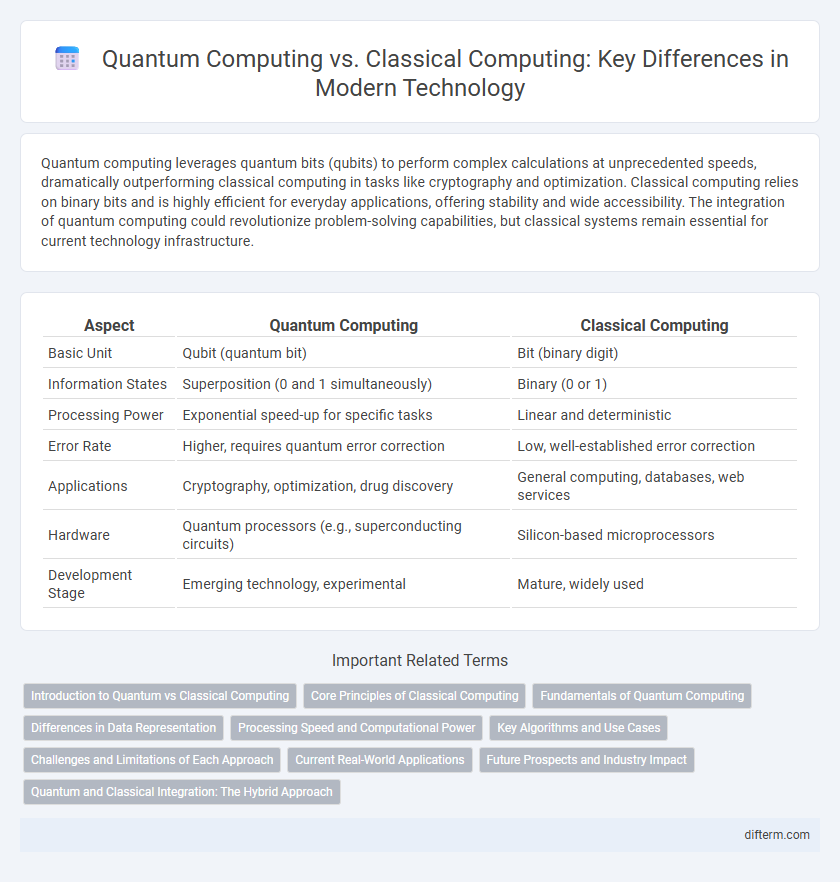Quantum computing leverages quantum bits (qubits) to perform complex calculations at unprecedented speeds, dramatically outperforming classical computing in tasks like cryptography and optimization. Classical computing relies on binary bits and is highly efficient for everyday applications, offering stability and wide accessibility. The integration of quantum computing could revolutionize problem-solving capabilities, but classical systems remain essential for current technology infrastructure.
Table of Comparison
| Aspect | Quantum Computing | Classical Computing |
|---|---|---|
| Basic Unit | Qubit (quantum bit) | Bit (binary digit) |
| Information States | Superposition (0 and 1 simultaneously) | Binary (0 or 1) |
| Processing Power | Exponential speed-up for specific tasks | Linear and deterministic |
| Error Rate | Higher, requires quantum error correction | Low, well-established error correction |
| Applications | Cryptography, optimization, drug discovery | General computing, databases, web services |
| Hardware | Quantum processors (e.g., superconducting circuits) | Silicon-based microprocessors |
| Development Stage | Emerging technology, experimental | Mature, widely used |
Introduction to Quantum vs Classical Computing
Quantum computing leverages quantum bits (qubits) that exploit superposition and entanglement to perform complex calculations exponentially faster than classical bits used in classical computing, which process information in binary form as zeros or ones. Classical computing relies on deterministic logic gates and sequential operations, whereas quantum computing uses quantum gates to manipulate qubits through probabilistic algorithms. This fundamental difference in data representation and processing enables quantum computers to solve specific problems like factoring large numbers and simulating quantum systems more efficiently than traditional classical computers.
Core Principles of Classical Computing
Classical computing relies on binary digits (bits) that represent data as either 0 or 1, utilizing Boolean logic to perform operations through deterministic gates such as AND, OR, and NOT. The Von Neumann architecture, a foundational framework for classical computers, separates the processing unit, memory, and input/output mechanisms to execute sequential instructions efficiently. This approach enables classical computers to handle a wide range of tasks with predictable accuracy but faces limitations in solving certain complex problems exponentially faster than quantum computers.
Fundamentals of Quantum Computing
Quantum computing leverages qubits, which can exist in superposition states, enabling parallel computations that vastly outperform classical bits limited to binary states. Entanglement connects qubits non-locally, allowing complex problem-solving through quantum algorithms like Shor's and Grover's. Quantum gates manipulate qubit states using unitary transformations, forming the basis of quantum circuits essential for quantum information processing.
Differences in Data Representation
Quantum computing uses qubits to represent data, leveraging quantum states that enable superposition and entanglement, which allow simultaneous processing of multiple possibilities. Classical computing relies on bits as the fundamental unit of data, representing information in binary form--either 0 or 1--resulting in sequential processing of operations. The core difference in data representation leads to quantum computers potentially solving complex problems exponentially faster than classical machines.
Processing Speed and Computational Power
Quantum computing leverages quantum bits (qubits) to perform complex calculations at speeds exponentially faster than classical computing's binary-based processors, enabling parallel processing of large datasets. Classical computing relies on sequential processing with transistors and logic gates, which limits its computational power and speed when handling certain algorithms like factorization or optimization problems. The superior processing speed and computational power of quantum computers position them as transformative tools for cryptography, material science, and large-scale simulations.
Key Algorithms and Use Cases
Quantum computing leverages algorithms like Shor's for factoring large numbers exponentially faster than classical algorithms, enabling breakthroughs in cryptography and optimization problems. Classical computing excels in deterministic and sequential processing with algorithms such as Dijkstra's for shortest path and quicksort for sorting, powering everyday applications in business, multimedia, and web services. Quantum key distribution offers revolutionary security, while classical systems dominate current financial modeling, database management, and machine learning tasks.
Challenges and Limitations of Each Approach
Quantum computing faces challenges such as qubit coherence, error rates, and the need for extremely low temperatures, limiting its current practical applications. Classical computing struggles with processing speed and energy efficiency when handling complex simulations and large-scale data analysis. Scalability remains a critical limitation for both technologies, impacting their ability to solve increasingly sophisticated problems efficiently.
Current Real-World Applications
Quantum computing excels in solving complex optimization problems and simulating molecular structures, significantly advancing drug discovery and materials science. Classical computing remains dominant in everyday applications such as data processing, web services, and artificial intelligence due to its stability and extensive software ecosystem. Hybrid approaches combining quantum and classical computing are emerging to enhance cryptography, financial modeling, and machine learning tasks.
Future Prospects and Industry Impact
Quantum computing promises exponential speedups for complex problem-solving tasks, potentially revolutionizing industries such as cryptography, pharmaceuticals, and supply chain optimization. Classical computing remains essential for everyday applications, but its limitations in processing power and speed drive investment towards scalable quantum technologies. The integration of quantum computing with classical systems is poised to reshape data analysis, AI development, and cybersecurity frameworks in the coming decades.
Quantum and Classical Integration: The Hybrid Approach
Quantum computing leverages qubits and quantum superposition to solve complex problems faster than classical bits used in traditional computing. The hybrid approach integrates quantum processors with classical systems, optimizing performance by delegating specific tasks to the most efficient processor type. This synergy enables advancements in cryptography, optimization, and machine learning through enhanced computational power and precision.
Quantum computing vs Classical computing Infographic

 difterm.com
difterm.com